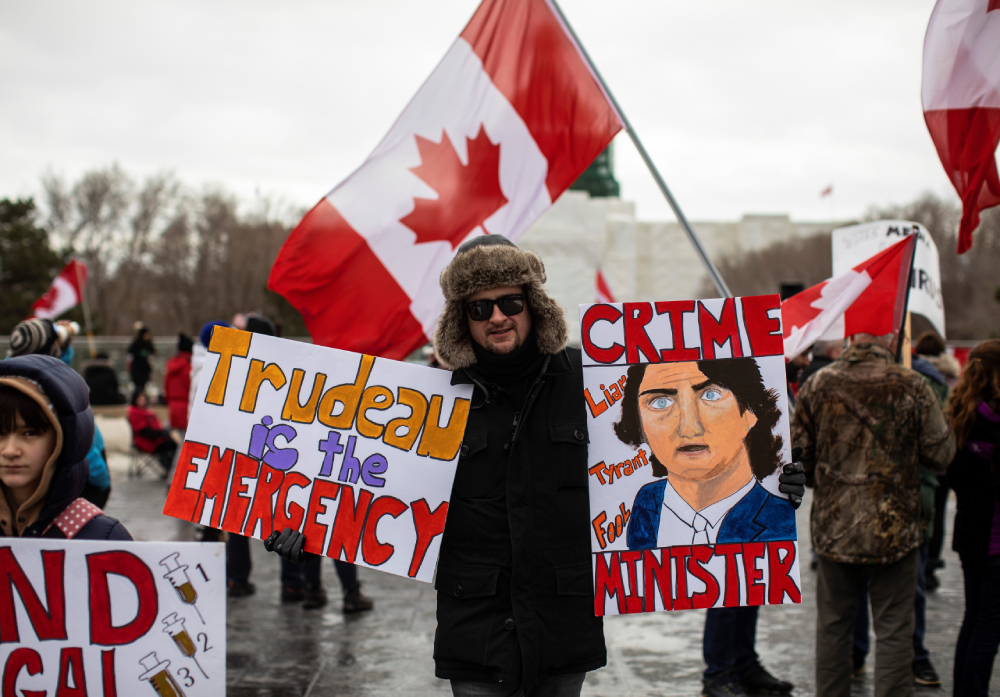A legal clock is ticking for the federal government to set up an inquiry to review its declaration of a public emergency in response to blockades and protests in Ottawa and other parts of the country.
The government ended the emergency order on Feb. 23. The Emergencies Act says an inquiry into “the circumstances that led to the declaration being issued and the measures taken for dealing with the emergency” must be held within 60 days.
More than half the time on the clock has already run out without government action.
Interestingly, the federal government did not invoke the Emergencies Act for the pandemic, although a number of provinces used their own emergency legislation to deal with COVID-19.
Perhaps that’s because the federal act imposes a number of legal constraints limiting the govenment’s freedom to act and imposing a measure of transparency and parliamentary oversight.
The government went in the opposite direction after the outbreak of the pandemic, with the Liberals and NDP voting to restrict the normal operation of Parliament for a number of months.
Similarly, the federal government has gone out of its way to avoid releasing information on several important issues.
Some recent examples:
- An ongoing battle with the House of Commons and its Liberal Speaker over failure to release documents related to firings at a high security Winnipeg lab.
- Responding to an access to information request by telling the requester that he could expect to get the records he requested in 80 years.
- The RCMP’s ongoing history of ignoring the legal requirements in the Access to Information Act.
In invoking the Emergencies Act, the federal government was required to consult with the provincial governments before making the declaration. It also had to submit its actions for approval by both the Commons and the Senate, which had to vote to confirm the declaration of an emergency (or not) within seven days.
Although the House voted in favour, the government’s decision to revoke the public order emergency meant the Senate did not have the opportunity to vote on the measure.
The act also requires the establishment of a joint parliamentary committee of both the House and the Senate, including members of all recognized parties in both houses. The primary function of this special committee is to review “exercise of powers and the performance of duties and functions pursuant to a declaration of emergency.”
The revocation of the emergency does not remove the requirement to create this joint parliamentary review committee.
The detailed schedule of when that committee must submit its report to each of the houses of Parliament is set out in Section 62(6) of the Emergencies Act.
But that isn’t the only public scrutiny that the government’s actions will be subjected to.
Section 63(1) of the act requires cabinet to set up an inquiry within two months of the end of whatever emergency has been declared.
“The Governor in Council shall, within 60 days after the expiration or revocation of a declaration of emergency, cause an inquiry to be held into the circumstances that led to the declaration being issued and the measures taken for dealing with the emergency.”
There is no definition of “inquiry” in the Emergencies Act, so presumably it would be an inquiry as set out in the Inquiries Act.
Commissioners appointed under the Inquiries Act can compel testimony from witnesses, order production of records and hire legal counsel and other experts to assist them.
This is very different from the “report” that is required under the Ontario Emergency Management and Civil Protection Act, whose provisions were invoked by Premier Doug Ford shortly before the federal government made its emergency declaration.
Section 7.0.10 of the Ontario law provides that “the premier shall table a report in respect of the emergency in the assembly within 120 days after the termination of an emergency declared under section 7.0.1 and, if the assembly is not then in session, the premier shall table the report within seven days of the assembly reconvening.”
The report required by the Ontario law is not done by an independent inquiry but prepared by the Office of the Premier. Although the Ontario law sets out the subject areas that the report must cover, it does so in very general terms.
This leaves a lot of scope for massaging or not revealing important information.
The Emergencies Act also requires the report of the inquiry to be tabled in both the House and Senate less than a year after the end of the emergency declaration.
This is lightspeed compared to recent federal inquiries.
The ongoing joint federal provincial inquiry into the Nova Scotia mass shootings of April 2020 has just begun its hearings. Its final report is due in November.
The National Inquiry into Missing and Murdered Indigenous Women and Girls was established in August 2016 and issued its final report in June 2019.
Declaring a state of emergency is serious business. It is vital that the circumstances around any use of such exceptional powers be subjected to serious scrutiny, both during and after the fact.
The federal government must appoint commissioners who are not only independent but seen to be independent, and ensure that the report is tabled within the timeline set out in the law.
There are still many questions to be answered around this unprecedented use of the Emergencies Act, and this inquiry is probably the best chance we have of getting those answers. ![]()
Read more: Rights + Justice, Federal Politics

















Tyee Commenting Guidelines
Comments that violate guidelines risk being deleted, and violations may result in a temporary or permanent user ban. Maintain the spirit of good conversation to stay in the discussion.
*Please note The Tyee is not a forum for spreading misinformation about COVID-19, denying its existence or minimizing its risk to public health.
Do:
Do not: